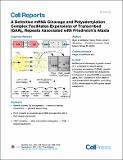| dc.contributor.author | McGinty, Ryan J. | |
| dc.contributor.author | Puleo, Franco | |
| dc.contributor.author | Aksenova, Anna Y. | |
| dc.contributor.author | Hisey, Julia A. | |
| dc.contributor.author | Shishkin, Alexander A. | |
| dc.contributor.author | Pearson, Erika L. | |
| dc.contributor.author | Moore, Claire | |
| dc.contributor.author | Mirkin, Sergei M. | |
| dc.contributor.author | Wang, Eric T | |
| dc.contributor.author | Housman, David E | |
| dc.date.accessioned | 2018-04-24T17:02:49Z | |
| dc.date.available | 2018-04-24T17:02:49Z | |
| dc.date.issued | 2017-09 | |
| dc.date.submitted | 2017-07 | |
| dc.identifier.issn | 2211-1247 | |
| dc.identifier.uri | http://hdl.handle.net/1721.1/114933 | |
| dc.description.abstract | Expansions of microsatellite repeats are responsible for numerous hereditary diseases in humans, including myotonic dystrophy and Friedreich's ataxia. Whereas the length of an expandable repeat is the main factor determining disease inheritance, recent data point to genomic trans modifiers that can impact the likelihood of expansions and disease progression. Detection of these modifiers may lead to understanding and treating repeat expansion diseases. Here, we describe a method for the rapid, genome-wide identification of trans modifiers for repeat expansion in a yeast experimental system. Using this method, we found that missense mutations in the endoribonuclease subunit (Ysh1) of the mRNA cleavage and polyadenylation complex dramatically increase the rate of (GAA) n repeat expansions but only when they are actively transcribed. These expansions correlate with slower transcription elongation caused by the ysh1 mutation. These results reveal an interplay between RNA processing and repeat-mediated genome instability, confirming the validity of our approach. Keywords: genome instability; repeat expansion; RNA polyadenylation; RNA processing; transcription-replication conflicts;
Friedreich’s ataxia; DNA double-strand breaks; trans-modifiers of repeat expansions; genetic screen; whole-genome sequencing | en_US |
| dc.publisher | Elsevier | en_US |
| dc.relation.isversionof | http://dx.doi.org/10.1016/J.CELREP.2017.08.051 | en_US |
| dc.rights | Attribution-NonCommercial 4.0 International (CC BY-NC 4.0) | en_US |
| dc.rights.uri | https://creativecommons.org/licenses/by-nc-nd/4.0/ | en_US |
| dc.source | Cell Reports | en_US |
| dc.title | A Defective mRNA Cleavage and Polyadenylation Complex Facilitates Expansions of Transcribed (GAA) n Repeats Associated with Friedreich’s Ataxia | en_US |
| dc.type | Article | en_US |
| dc.identifier.citation | McGinty, Ryan J. et al. “A Defective mRNA Cleavage and Polyadenylation Complex Facilitates Expansions of Transcribed (GAA) n Repeats Associated with Friedreich’s Ataxia.” Cell Reports 20, 10 (September 2017): 2490–2500 © 2017 The Author(s) | en_US |
| dc.contributor.department | Koch Institute for Integrative Cancer Research at MIT | en_US |
| dc.contributor.mitauthor | Wang, Eric T | |
| dc.contributor.mitauthor | Housman, David E | |
| dc.relation.journal | Cell Reports | en_US |
| dc.eprint.version | Final published version | en_US |
| dc.type.uri | http://purl.org/eprint/type/JournalArticle | en_US |
| eprint.status | http://purl.org/eprint/status/PeerReviewed | en_US |
| dc.date.updated | 2018-04-20T18:45:52Z | |
| dspace.orderedauthors | McGinty, Ryan J.; Puleo, Franco; Aksenova, Anna Y.; Hisey, Julia A.; Shishkin, Alexander A.; Pearson, Erika L.; Wang, Eric T.; Housman, David E.; Moore, Claire; Mirkin, Sergei M. | en_US |
| dspace.embargo.terms | N | en_US |
| dc.identifier.orcid | https://orcid.org/0000-0001-5016-0756 | |
| mit.license | PUBLISHER_CC | en_US |
